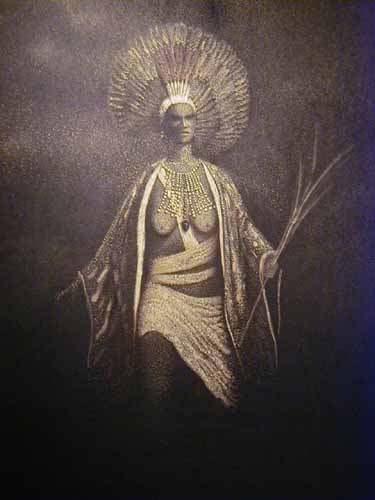return to Home Page
or move on to Goddess Calliope, next chronologically,
or use Her Cyclopedia Index
Califia, Old-Woman.
K*LYFY*
[to Whom the fifth day of August, day 217, is dedicated]

return to Home Page
or move on to Goddess Calliope, next chronologically,
or use Her Cyclopedia Index
Califia, Old-Woman.
K*LYFY*
[to Whom the fifth day of August, day 217, is dedicated]

Geography/Culture: Celtic: Spanish.
Linguistic Note: it is said that the origin of the state name California is probably from the fabled island of California {ruled by the Goddess Califia?} in the Spanish romance Las Sergas de Esplandian (1510), by Garcia Ordóñez de Montalvo -- see also Encyc Brit 26v5: California, Lower, & Encyc Brit 47v4: California. {The only reference I've found to Califia, the Goddess, is in Walker WEMS -- she gives no reference for her source but I believe it must be the above mentioned Spanish romance}.
Description: Black Queen; Ruler of the Western paradise; large-mouthed Goddess of earth, rocks and mineral wealth; She Whose territory is rich in silver, gold and gems; Creator of mountain ranges; perhaps Eponym of California.
Geography/Culture: Celtic: Spain.
Linguistic Note: It is thought possible that the place-name Berre, in Caillech-Bérri, has usurped the place of the personal name Bera.
Description: Queen of Spain; Daughter of the king of Spain; {perhaps} Eponym of Bearhaven in County Cork.
Male Associate: Consort: Eoghan-Raidhleach.
Geography/Culture: India: Dravidian, Khonds.
Description: Goddess of earth, to Whom human sacrifice was offered.
Geography/Culture: Celtic.
Linguistic Note: {I wonder whether Highland Gaelic buidseach, 'witch', Manx: butch, might be etymologically connected; then again I wonder whether bui- could be related to 'build', which seems to have an early Teutonic form in buan, 'to dwell' (Skeats - Build). But compare also Buana, Beneificant-Queen, Who is linked with Boann.}
Male Associates: Consort: Lugh.
Geography/Culture: Celtic: Ireland > Scotland.
Linguistic Note: The above form of Her name is the Highland Scots variant -- phonetic rendering doubtful. Gaelic: Cailleach, 'old woman' (see also
Cailleach Linguistic Note, (linked with Baba). Bhérri (and its variants -- below) are believed by some to be after the place name Bearhaven in County Cork, but it is possible the place-name has usurped the proper name Bera. {The only reference I have for bheur meaning 'winter' is Monaghan BGH as though: cold 'Brrrr'.}
Description: Crone Goddess; She of great strength and endurance; the Hag of Beara; Giantess; Old gloomy Woman; Mountain mover; {She Who brings about the breaking of ties}; She Who drops cairns from Her apron; Builder of mountains from the rocks in Her creel; Mover of islands; Shaper and Guardian of the land; Bestower of sovereignty; Consort of kings; Queen of the Limerick fairies; Divine Ancestress of numerous progeny; Epitome of longevity; She Who passes repeatedly through the cycle of youth and age; She Who 'existed from the long eternity of the world'; {perhaps} Guardian of animals from predators and hunters.
(Some say also:) Water Hag; Spirit of wells, lakes, rivers and the ocean; She Who protects lakes from being drained; She Whose province is the weather, especially winter weather; Crone of Thunder; Forecaster of storms.
In Christian times She became a nun.
Invocations, Pleas, Hymns and Other Homage to HER: Caillech-Bhérri.
To Whom Sacred: crane (in Scotland, with twigs in Her beak, She forecasts storms {ie: Spring? This association with cranes and twigs implies also a connection with the Beth Luis Nion}); magical pony (Her steed, which could leap from one hill-top to another); Sliabh na Caillighe, 'the Hag's Mountain' (in County Meath); apron (mountains are built from the rocks which fall from Her apron -- some say: when the ties break, some: because She chooses to drop them); creel (a type of basket -- in Scotland: alternative to the apron as source of mountains); slachdan (Her staff of power, which She carries); the number 3 (She formed the three principle cairns of Sliabh na Caillighe from three apronfuls of stones); megalithic standing stones (some bear Her name -- She is said to have raised many of them Herself).
Male Associates: Perhaps Dagda was once considered Her consort {since She is also known as Digdi}.
Geography/Culture: Celtic: Milesian (Irish), from Spain. The use of the term Milesian to signify a native of Ireland is said to be after Milesius (Miledh), a legendary Spanish king referred to as an ancestor of the Irish people. These Milesians are said to have originated in Greece early in the second millennium BC, and to have taken many generations to reach Ireland, after wandering about the Mediterranean. Milesian also means a native or inhabitant of Miletus, an ancient Ionian city on the west coast of Asia Minor, near the mouth of the Menderes, said to have been built by Miletus, a son of Apollo. There is descrepancy between AHDEL & G,R.WG]
Linguistic Note: Scot is derived from Old English Scott, pl. Scottas, 'the Irish', from Old Irish Scuit, 'the Irish', nominative singular Scot: ? 'the Wanderers'; a Gaelic tribe who migrated from Ireland to northern Britain about the sixth century AD. -ia, is a territorial suffix.
Description: Daughter of the king of Egypt; Daughter of the king of Spain; [Princess of the Other World]; Perhaps Goddess of rocks and mountains; perhaps Eponym of Scotland.
(The Gaelic Other World, a land of perpetual pleasure, is variously conceived, often as an island, sometimes called The Land of Women. Some mythographers believe the post-Christian Irish chroniclers substituted Spain for this land.)
To Whom Sacred: dolmen; baetyls with Ogham markings (She is said to be buried on Slieve Mis, where a row of dolmens stand between two baetyls with Ogham markings).
Male Associates: Consort: Niul, son: Goidel.
Geography/Culture: Greek.
Linguistic Note: Greek skotia, 'darkness, gloom'. Skotos, 'the darkness of death; of blindness; metaphorically, indistinct, uncertain'. Cretan boys were called Scotioi, ie, still members of the women's quarters.
Description: Goddess of death.